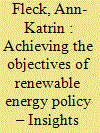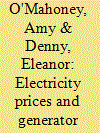| Srl | Item |
| 1 |
ID:
191149


|
|
|
|
|
| Summary/Abstract |
Many countries choose policy objectives around their renewable energy expansion targets, such as efficiency and effectiveness. Due to the different nature and impact of those objectives, not all can be achieved simultaneously, so prioritising objectives is advisable. In this paper, we theoretically analyse the relationship between objectives and show that most European countries with renewable energy auctions in place have defined incoherent policy strategies in their respective renewable energy legislation. Based on these strategies, we analyse which objectives lead to the choice of which auction design elements conducting a qualitative comparative analysis. Considering 269 auction rounds from 20 European countries in the period 2011–2020, not all resulting choices of auction designs are in line with auction theory and existing literature’s findings on the relationship between objectives and auction design. Nevertheless, we show that on a country-level basis, most considered countries choose congruent auction designs, which either support all their (coherent) stated objectives or prioritise one or several of their incoherent objectives. For those countries with an incongruent auction design, we give recommendations on how to adapt their auction design depending on their exact choice of policy objectives.
|
|
|
|
|
|
|
|
|
|
|
|
|
|
|
|
| 2 |
ID:
126543


|
|
|
|
|
| Publication |
2013.
|
| Summary/Abstract |
Electricity market liberalisation has become common practice internationally. The justification for this process has been to enhance competition in a market traditionally characterised by statutory monopolies in an attempt to reduce costs to end-users. This paper endeavours to see whether a pool market achieves this goal of increasing competition and reducing electricity prices. Here the electricity market is set up as a sealed bid second price auction. Theory predicts that such markets should result with firms bidding their marginal cost, thereby resulting in an efficient outcome and lower costs to consumers. The Irish electricity system with a gross pool market experiences among the highest electricity prices in Europe. Thus, we analyse the Irish pool system econometrically in order to test if the high electricity prices seen there are due to participants bidding outside of market rules or out of line with theory. Overall we do not find any evidence that the interaction between generator and the pool in the Irish electricity market is not efficient. Thus, the pool element of the market structure does not explain the high electricity prices experienced in Ireland.
|
|
|
|
|
|
|
|
|
|
|
|
|
|
|
|